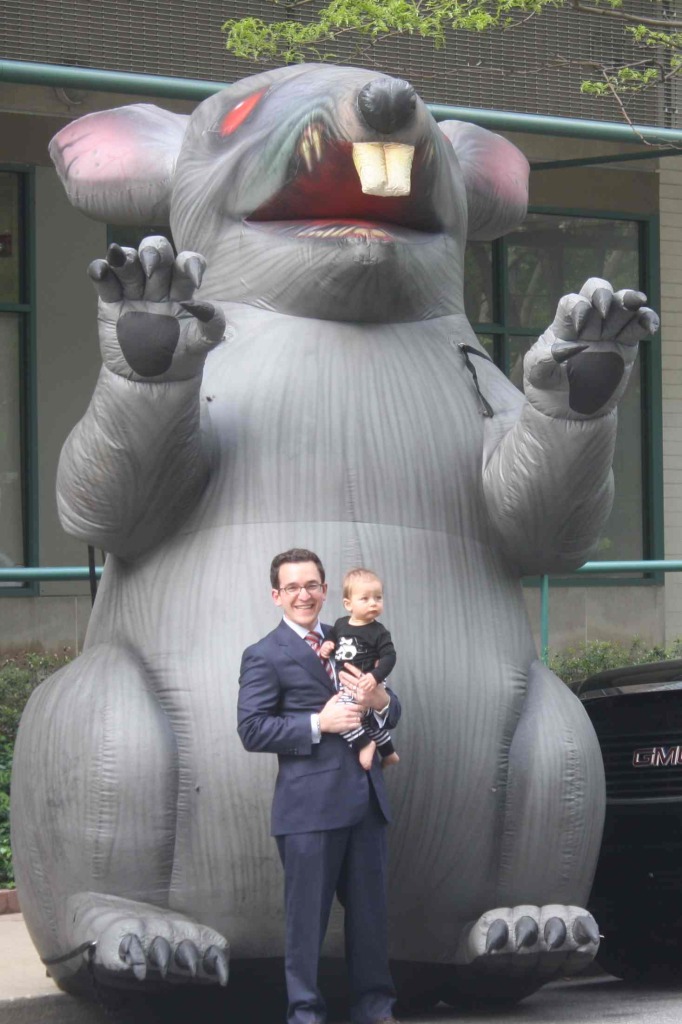Search
The union organizer running those rat protests and casket actions doesn’t get paid overtime.
Oh, yeah? Tell me more.
Let me tell you about a guy. A guy in charge of inflatable rats and staged funerals.
Daniel Krupinski graduated from Berkeley. Armed with a bachelor’s degree in international business, he went to work for the Laborers Eastern Region Organizing Fund (LEROF), the organizing arm of the Laborers International Union of North America (LIUNA).
Over the span of about four years, Mr. Krupinski worked his way up from Volunteer Organizer to Organizer I to Organizer II, aka the guy in charge of “rat actions” and “casket actions.” A “rat action” involves blowing up an inflatable rat in protest at a non-union worksite. The purpose of a “casket action” (like this one) is to protest perceived substandard working conditions.
Tongue out of cheek, Krupinski’s deposition testimony would lead one to believe that Organizer II is a pretty big deal:
Krupinski testified that focusing this kind of negative attention on non-union companies is a powerful means of persuading them to change their practices. Krupinski further testified that a successful rat or casket action generally requires “keep[ing] the line active as much as possible, and talk[ing] to people and [telling them] well developed stories, examples, and, basically, provid[ing the workers at a site] with knowledge about [the] industry, about the danger[s] they are facing” by working in substandard conditions, and how LIUNA can help them address those issues. In short, rat and casket actions advance LEROF’s core mission to “eliminate as many as possible non-union comparisons on the market” and increase LIUNA’s market share.
Still, Mr. Krupinski claimed that he was entitled to overtime compensation in those workweeks in which he worked over 40 hours.
LEROF was like…because it claimed that Mr. Krupinski qualified under the exemption for administrative employees under the Fair Labor Standards Act.
The guy in charge of “rat actions” and “casket actions” gets no cheese overtime.
Under the FLSA, the burden is on the employer to establish that an employee is exempt from the overtime requirements. Demonstrating that an employee qualifies for the administrative exemption involves checking three boxes:
- The employee is paid a salary of at least $455 per week;
- His/her primary duty is the performance of office or non-manual work directly related to the management or general business operations of the employer or the employer’s customers; and
- His/her primary duty includes the exercise of discretion and independent judgment with respect to matters of significance.
The court determined (here) that the employer had met its burden:
- LEROF paid Mr. Krupinski a salary of over $455 per week;
- Although Mr. Krupinski was in the field a lot, his efforts were aimed at organizing, which in turn, did not depend on physical talents. Thus, his work was non-manual. Further, the court likened his efforts to advertising or marketing, which related to the general business operations of LIUNA.
- Mr. Krupinski decided which workers to target and how to target them. Thus, he exercised discretion and independent judgment as to matters of significance.
Employer takeaways…
In my experience, when HR professionals with less experience rely on something — other than Google — to support an FLSA exemption, it’s the administrative exemption. However, the administrative exemption can be particularly difficult to establish. While the salary level is often clear-cut, the remaining two prongs have many nuances. Indeed, when faced with similar sets of facts, courts around the country will reach different conclusions on whether the administrative exemption applies.
Therefore, before you slap an exemption on a job description — especially where it may be a close call — make another call…to an employment lawyer for an assist.
Speaking of which, if you need some last-minute tips in preparing for the new DOL Overtime rules, I’ve got a slide deck to share. Just email me, and it’s yours.
 The Employer Handbook Blog
The Employer Handbook Blog



